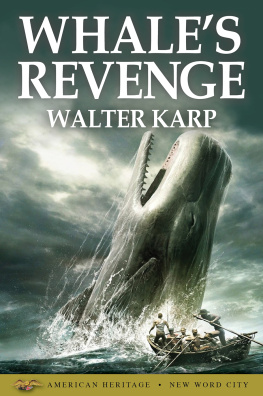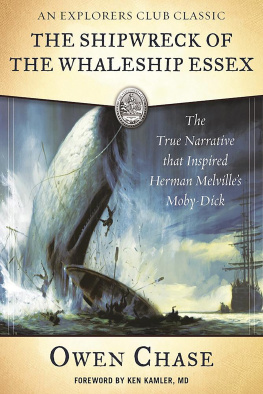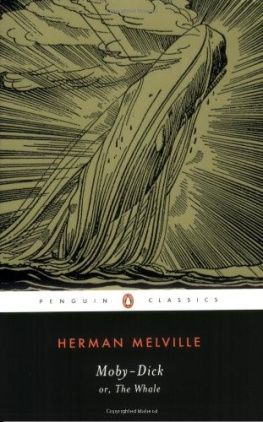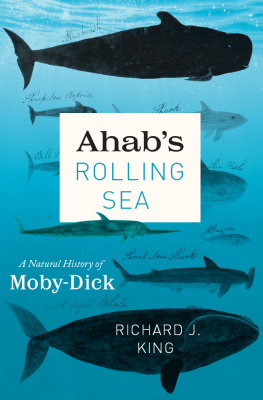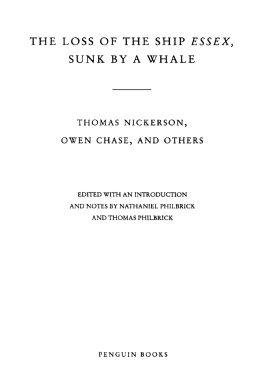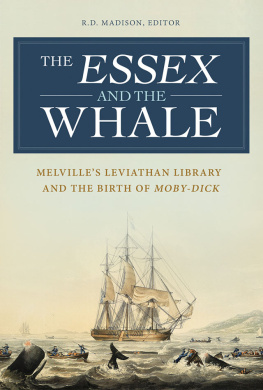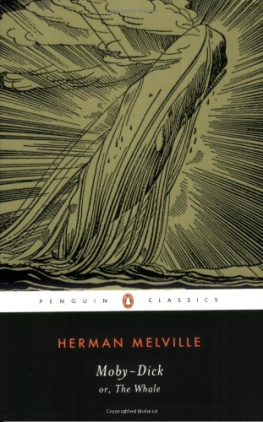Walter Karp - Whales Revenge
Here you can read online Walter Karp - Whales Revenge full text of the book (entire story) in english for free. Download pdf and epub, get meaning, cover and reviews about this ebook. year: 2014, publisher: New Word City, genre: Adventure. Description of the work, (preface) as well as reviews are available. Best literature library LitArk.com created for fans of good reading and offers a wide selection of genres:
Romance novel
Science fiction
Adventure
Detective
Science
History
Home and family
Prose
Art
Politics
Computer
Non-fiction
Religion
Business
Children
Humor
Choose a favorite category and find really read worthwhile books. Enjoy immersion in the world of imagination, feel the emotions of the characters or learn something new for yourself, make an fascinating discovery.
- Book:Whales Revenge
- Author:
- Publisher:New Word City
- Genre:
- Year:2014
- Rating:5 / 5
- Favourites:Add to favourites
- Your mark:
- 100
- 1
- 2
- 3
- 4
- 5
Whales Revenge: summary, description and annotation
We offer to read an annotation, description, summary or preface (depends on what the author of the book "Whales Revenge" wrote himself). If you haven't found the necessary information about the book — write in the comments, we will try to find it.
Here, in this short-form book by award-winning historian and journalist Walter Karp, is the harrowing story of the Essex, which was sunk by an eighty-ton whale and inspired the writing of Moby Dick.
Whales Revenge — read online for free the complete book (whole text) full work
Below is the text of the book, divided by pages. System saving the place of the last page read, allows you to conveniently read the book "Whales Revenge" online for free, without having to search again every time where you left off. Put a bookmark, and you can go to the page where you finished reading at any time.
Font size:
Interval:
Bookmark:
To the whaling men of Nantucket , the year 1819 promised good fortune. The islands fleet, ravaged by the War of 1812 , numbered sixty-one vessels, and fresh hunting grounds had been discovered in the equatorial waters of the central Pacific. These new areas lay 17,000 sailing miles away in ill-charted seas, but Nantucket whalers routinely made voyages few explorers could match. Reaching the grounds usually meant rounding Cape Horn , but Nantucketers knew those waters well and had been navigating them since 1792, chasing sperm whale s , whose oil lit the music-filled ballrooms of Europe. On this voyage, the tune would turn - the whales would have their revenge. The story would inspire Herman Melville to write Moby-Dick.
The doomed bear no marks of distinction. When the Essex sailed for the southern seas on August 12, 1819, it was a typical Nantucket whaler with a typical whaling crew. The ship was a tubby 238-tons with three-master masts, and it was provisioned for two-and-a-half years without putting into port. Nantuckets whaling men disliked depending on the land. The chief officers were experienced seamen: George Pollard , recently first mate of the Essex, was now, at age thirty, its captain. His comparative youth was not unusual; whaling was a young mans occupation. Owen Chase , recently boatsteerer on the Essex, age twenty-three, was its first mate.
Foreigners in the twenty-man crew included one Englishman, one from Portugal, two Cape Codders from Barnstable, and six African Americans, whose presence was commonplace. Nantuckets ship owners, half of them Quakers , cared nothing about race. Uncommonly heedful of what manner of men they shipped, as Melville was to put it, they wanted crews of courage and character and common sense. Hunting the sperm whale, whose twenty-foot tails could splinter a boat, was too dangerous and exacting for lesser men.
For the first fifteen months of the Essexs voyage, nothing eventful occurred. There were storms, spills, and bruises - routine hazards of the hunt. By January 1820, the Essex had sailed back and forth around the Horn in gales so fierce and seas so mountainous that it had taken five weeks to make the brief passage. For several months after, the ship and its crew hunted off the coast of Chile. They slaughtered eight whales, then heading north off the Peruvian coast, they brought in several more. Already, the cruise was proving successful.
In October, the men of the Essex sailed for the uninhabited Galpagos Islands , which a young naturalist named Charles Darwin was to visit fourteen years later aboard HMS Beagle. They repaired a leak and stocked up on turtle s , which they would later slaughter for meat, before plunging westward along the equator to the new whaling waters.
On the morning of November 20, two of the ships whaleboats hunted. Captain Pollard commanded one; Second Mate Matthew Joy, the other. First Mate Chase was onboard the Essex with a crew of five, making repairs to a third whaleboat.
Chase saw it first - a sperm whale a ships length away, by his estimation more than eighty feet long, swimming toward the bow of the Essex. He wasnt alarmed, however. The sheer strength and size of the animal makes it dangerous to hunt in small whaleboats, but no whale had ever attacked a large ship. I involuntarily ordered the boy at the helm to put it hard up, intending to sheer off and avoid him, Chase later wrote.
What happened next shocked him and his men. His order was scarcely spoken before the whale, at full speed, struck the ship with its head. The Essex trembled from the blow, and we looked at each other with perfect amazement, deprived almost of the power of speech. Minutes later, a man shouted: Here he is - he is making for us again! Having passed under the Essex, the whale had turned to ram it once more. To Chase, it appeared with twice his ordinary speed, and... with tenfold fury and vengeance in his aspect. This time when it struck, the whale crushed the bow of the Essex. Grabbing what they could, the men on board jumped into a whaleboat, pulled at its oars until they were clear of the ship, then sat in silence and despair as they watched the Essex slowly heel on its side and settle into the vast, empty sea.
Chase and his sailors sat in their whaleboat absorbed in our own melancholy reflections. Meanwhile, the steerer of Captain Pollards boat spied the grim scene. Oh, my God, he cried, where is the ship? Pollard leapt to his feet and saw the ships masts and sails dipping into the sea. He fell back into the boat, ashen-faced. My God, Mr. Chase, he called out, what is the matter? Chase answered, We have been stove in by a whale.
The plight of the Essex men, shipless and in three tiny boats on the vast Pacific, was almost hopeless. Their location - devoid of islands and maritime traffic - was, according to Chases reckoning: 040 south latitude, 119 west longitude. To the east, the nearest landfall was Peru - 2,400 miles away, but even that coast was out of reach, because along the equator the ocean current runs westward and winds are scarce. A southeast voyage would have been worse; below the equator, the southerly trade winds would blow directly against the whaleboats small square sails. There was nothing due south but a few distant speckles of land and nothing beyond them but Antarctica .
Only one direction held promise. The Marquesa Islands lay 1,500 miles southwest of them. Favoring winds and a west-running current made the voyage feasible, but they dared not sail there. We feared, Captain Pollard later explained, that we should be devoured by cannibals if we cast ourselves on their mercy. Had the insular Nantucket men known it, the Marquesas were friendly Polynesian territories. A U.S. naval commander had claimed them for the United States in 1813. And making the whale's revenge all the richer, their dread of cannibalism would prove a more grisly irony than they could have imagined.
To reach safety, Pollard and Chase had no choice but to attempt an immense zig-zag south to 25 south latitude, 1,900 miles away. There, in variable, often westerly, winds, they would make for Chile, some 2,200 miles away due east. It was a daunting prospect. The twenty men would have to make a 4,100-mile voyage in three open whaleboats, 500 miles farther than even Captain William Bligh had gone in the launch of the HMS Bounty, thirty-one years before. Nor did the Essex crew have sturdy, powerfully built launches to carry them through the caprices of sea and wind. The Nantucket whaleboat was a remarkable vessel, so light and buoyant it could keep its bow above the most riotously perverse and cross-running seas, as Melville put it. Unfortunately, it was as frail as it was buoyant, a boat made for easy repair since it was likely to be damaged by a whale at least once during a hunt. All that stood between a whaleboats crew and the ocean depths was a half-inch of overlapping cedar planks. The Essex men didnt want to ponder too closely how such a fragile, leaky craft would fare over 4,000 miles, through shark-infested waters and tropical gales.
GNAWING DREAD, HOWEVER, assailed them only at nightfall, according to Chases account. On the morning of the disaster, they acted with the whalingmans customary skill and dispatch. Captain Pollard ordered the sails and masts of the stricken ship cut away so it might right itself sufficiently to allow them to go aboard for supplies. Eventually, they got into the hold by chopping a hole in the exposed hull of the ship. By midday, they had managed to obtain 600 pounds of bread, 135 gallons of water, six live Galapagos turtles, one musket, two pistols, some carpenters tools, two pounds of nails, two compasses, two quadrants , and two navigational manuals. They had, Chase reckoned, about sixty days worth of food, but no way, aside from dead reckoning , to calculate their position.
Next pageFont size:
Interval:
Bookmark:
Similar books «Whales Revenge»
Look at similar books to Whales Revenge. We have selected literature similar in name and meaning in the hope of providing readers with more options to find new, interesting, not yet read works.
Discussion, reviews of the book Whales Revenge and just readers' own opinions. Leave your comments, write what you think about the work, its meaning or the main characters. Specify what exactly you liked and what you didn't like, and why you think so.

